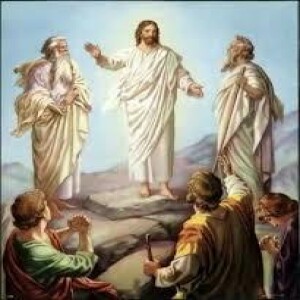
Sermon for Transfiguration Sunday
“The Glory of God in the Face of Jesus”
Mark 9:2-9 and 2 Corinthians 4:5-7
Let us pray: Let the words of my mouth and the meditation of our hearts be acceptable in Your sight, O Lord, our Rock and our Redeemer. Amen. (Psalm 19:14)
The text for our meditation this evening is the Gospel lesson, from Mark 9, along with a few thoughts from our Epistle lesson.
About a week before our text, the disciple Peter had made a great and true confession of faith, saying to Jesus, “You are the Christ,” the Messiah, the Anointed One sent from God to be the Savior (Mark 8:29). Soon after that, Jesus began to tell His disciples that He needed to suffer much and be killed and after three days rise again. He had indicated this before, but now Jesus said it plainly (Mark 8:31-32).
Right away, Peter took Jesus aside and began to rebuke Him, telling Him that He was wrong and shouldn’t be saying such things. Jesus then had to rebuke Peter, telling him that his mind was not on God’s will, but on his own will and desires, and that he was actually serving Satan, the devil, in this thinking (Mark 8:32-33). Clearly, Peter and the other disciples still had much to learn about Jesus and God’s saving plan. Peter, in particular, could be so strong and right one moment and so weak and confused the next.
Doesn’t that sound like us, too, at times? We can be so strong in faith, but when God’s will and ways don’t seem to fit with our wishes and desires, we can sometimes question and struggle, too. Jesus cared about these disciples, as He cares about us; and Mark, who wrote this Gospel, inspired by God, makes it very clear that Jesus purposely took Peter and James and John along for His Transfiguration so that their faith in Him might be strengthened.
We hear in our text that Jesus took these three leaders of the disciples and led them up a high mountain by themselves and then was transfigured before them. A little later, we hear that there appeared to them, to these disciples, Elijah and Moses, great prophets and leaders of the Old Testament, talking with Jesus. And a little later, a cloud overshadowed them, including the disciples - a cloud as in the Old Testament, when God Himself appeared to His people, and the voice of God the Father came from the cloud, telling the disciples, “This Jesus is My Beloved Son!” - the Son of God and God the Son.
That was indicated, too, by the way Jesus was transfigured. The Greek word here is “metamorphosis” - “a dramatic change in physical form, a striking alteration in appearance,” Webster’s Dictionary says. We think of the change from a caterpillar to a beautiful butterfly. In Jesus’ case, it was much more than that. Jesus was a real man, a human being, like us - and yet now the disciples had a glimpse of what He also was - God the Son Himself. They or any of us could only handle a glimpse, in this life, of that glory.
The clothes of Jesus were radiant, intensely white, whiter than bleach or Tide or Oxi-Clean or any humanly made product could make a robe or anything else, and Matthew’s Gospel says that Jesus’ face “shone like the sun” (Matthew 17:3). We all know how long we could stand to look at that brilliance.
Clearly, this amazing experience showed that Jesus was God the Son, and God the Father then literally said to the disciples, “Keep on listening to Him" - to Jesus - and following Him. Our text says that the disciples were terrified by all this, and Peter didn’t know what to say, except that he wanted to keep the glory and the miracle of all this going by following an Old Testament festival, where God’s people would build temporary booths and tent-like structures and remember the glory days of the past.
But that was not to be. Suddenly no one was with the disciples, but Jesus only, and He looked in His ordinary way. And they had to come down from the mountain to their ordinary lives, with joys but many challenges and troubles. Jesus particularly had to come down to just what He had predicted, and to what we will hear about in the Lenten season, starting this coming Wednesday, Ash Wednesday.
The Transfiguration event was also for His benefit - for Jesus was a real man, too, not always using His Godly powers. He was tempted as we are and yet did not sin (Hebrews 4:15). As we heard last week, Jesus kept praying to His Heavenly Father and leaning upon Him for His strength, as God’s Beloved Son. He kept listening to God’s Word, given through Moses and Elijah and the other Old Testament writers, and following it. In fact, Luke tells us in his Gospel that on the Mount of Transfiguration, Moses and Elijah were talking with Jesus about His departure, His “exodus,” His “going out” from this world, at Jerusalem (Luke 9:30-31), and they surely were encouraging Him always to do His Father’s will. They knew that they had failed at that, even as great leaders. Moses had gone against God’s will and was not able to enter the promised land of Israel, but he was forgiven and entered into eternal life, by God’s grace. Elijah also had rough times. He once was so discouraged that he wanted to lay down and die. He too went to eternal life, by God’s grace.
Jesus, though, perfectly followed His Father’s will in the days following the Transfiguration. He suffered many things and was rejected by the religious authorities and many others, and was killed in a most horrible way, by crucifixion, and after three days, rose from the dead. Above all, He paid the penalty for the sins of His disciples and of the whole world, including you and me - the penalty we should have had to pay. He conquered sin and Satan and death for us all - and we receive forgiveness and new life and the promise of life everlasting, in return, through the gift of faith and trust in what He did for us, that God works in us. And one day, we also will stand with Moses and Elijah and with Jesus, in the glory of heaven.
How important all this was for Jesus’ disciples. They didn’t do so well in the days following the Transfiguration. They still didn’t understand Jesus’ words about suffering and dying and rising. When He was arrested, they all ran away. Even Peter, in fear, denied three times that he ever knew Jesus - though he’d seen that glorious mountaintop event. The disciples huddled in fear after Jesus died until He appeared to them as the Risen Lord and forgave them and strengthened them for 40 more days, through God’s Word, and then He and God the Father sent them His Holy Spirit.
And the Spirit inspired Biblical writers and preachers to put down in a perfect way the New Testament, as well as the Old, so that to this day, we can still keep listening to Christ Jesus and hearing of all He did and continues to do for us, as our Savior, just as God the Father asked us to listen, on the Mount of Transfiguration. We have the Word, through which the Father, Son, and Holy Spirit, the Triune God, works. And we have the Word, connected with water in the gift of Holy Baptism, and the Word connected with bread and wine and the very Body and Blood of Christ, given and shed for us, in the Lord’s Supper.
Even with all that, the early church was not perfect, except as counted that way in the eyes of God, through Christ and His forgiveness, earned for them and for us.
- Peter and Paul had some difficulties with each other.
- Paul and John Mark, who wrote the Gospel we’re hearing today, had a falling out with each other at one point.
- The churches we hear about were not perfect.
- And we are certainly not sitting here tonight as a perfect church and perfect people.
But we know where our hope always is. Paul put it so well in our Epistle lesson for today. He said, “What we proclaim is not ourselves (or our church, or the great things we are doing). But we proclaim Jesus Christ as Lord, with ourselves simply as servants, for Jesus' sake. For God, who said, “Let Light shine out of darkness,” has shone in our hearts to give the Light of the knowledge of the glory of God in the face of Jesus Christ.
In fact, in the very next verse, after this Epistle, Paul says, “We have this great treasure” - the Good News of the Gospel of Christ and what he has done for us, together with the Father and the Holy Spirit - we have this great treasure “in jars of clay.” We are the jars of clay, with all our chips and cracks and imperfections, and yet we are also the children of God, through the love and forgiveness of Jesus.
And, Paul says, “We have this treasure in jars of clay, to show that the surpassing power belongs to God and not to us” (2 Corinthians 4:7). And our great Triune God is enough, all we need, for this life and for eternal life to come.
Please rise for prayer. Now may the peace of God, which passes all understanding, keep our hearts and minds safe (only where they are safe) in Christ Jesus our Lord. Amen.
More Episodes
 2024-11-06
2024-11-06
 4
4
 2024-11-06
2024-11-06
 3
3
 2024-11-06
2024-11-06
 3
3
 2024-11-01
2024-11-01
 8
8
 2024-10-22
2024-10-22
 6
6
 2024-10-22
2024-10-22
 3
3
 2024-10-15
2024-10-15
 5
5
 2024-10-15
2024-10-15
 4
4
 2024-10-03
2024-10-03
 6
6
 2024-09-28
2024-09-28
 6
6
 2024-09-28
2024-09-28
 3
3
 2024-09-28
2024-09-28
 5
5
 2024-09-18
2024-09-18
 11
11
 2024-09-13
2024-09-13
 4
4
 2024-09-06
2024-09-06
 4
4
 2024-08-31
2024-08-31
 5
5
 2024-08-31
2024-08-31
 1
1
 2024-08-23
2024-08-23
 11
11
 2024-08-15
2024-08-15
 11
11
Create your
podcast in
minutes
- Full-featured podcast site
- Unlimited storage and bandwidth
- Comprehensive podcast stats
- Distribute to Apple Podcasts, Spotify, and more
- Make money with your podcast
It is Free
- Privacy Policy
- Cookie Policy
- Terms of Use
- Consent Preferences
- Copyright © 2015-2024 Podbean.com






